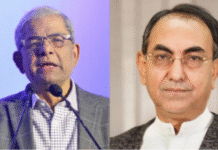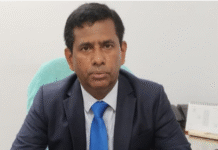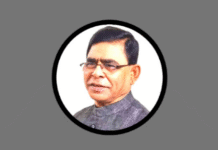
The horror and the deaths had turned it into hell on earth in 1971.
The Wapda compound in Barishal city, infamous in the area as a torture centre and a mass killing ground of the Pakistan occupation forces, saw 25 to 30 Bangalees brutally killed every morning.
Shafiur Rahman Jamal’s father was one of them.
A resident of Kalish Chandra area of what is now Barishal city, Jamal himself and his older brother Kamal had been captured in lieu of their father Mojibur Rahman Kanchan.
Kanchan, a cultural worker and veteran freedom fighter, had escaped the house shortly before members of the Pakistan army came to their house looking for him. So, they picked up the two brothers and sent them to Wapda camp.
“But my father was shot dead and killed there.”
The Water and Power Development Authority (Wapda) compound has witnessed multiple such gruesome acts of torture, killing, and rape during the Liberation War.
MAG Kabir Vulu, who was captive there, said, ”We were sent to the Wapda Pakistani army camp in Barishal town in July 1971.”
He had previously been incarcerated at Gournadi Pakistani army camp in Barishal, where he had been severely tortured. “Both my legs were severely injured by bayonets. I did not know the reason for my transfer from Gournadi to Barishal town,” he said.
“My friend Anwar, who was bigger and stronger looking, had been brought with me. One morning, he was picked up and dragged away. Then I heard the sound of gunfire. In the same way, the then student leader Firoj Kabir was also shot dead.”
Kabir, who had been spared, also described the other killings at Wapda on the banks of Kirtankhola river in Barishal town.
Every day, people were brought by trucks from different parts of Barishal, Jhalakati, and Pirojpur. “In the early morning the next day, they were taken to the banks of the river and after that I would hear gunshots.”
Barishal Sangskritik Sangathan Samannay Parishad has been calling for initiatives to preserve the memories of the Liberation War at Wapda since 1996, said Syed Dulal, former president of the organisation.
After a few delays, it will finally be inaugurated for the public today, the day the city of Barishal was liberated from Pakistani occupation forces, as a significant reminder of sacrifices in the war.
PRESERVATION
Barishal City Corporation, with the help of the Liberation War Museum, has preserved and restored the Wapda compound as the largest memorial of the Liberation War and genocide in the south.
The compound includes two wartime torture cells and two bunkers, as well as an open stage, auditorium, and a walkway which have been constructed so that visitors can tour the compound and pay their respects.
BCC sources said the preservation and restoration work started in 2017 at a cost of Tk 3.31 crore.
The bridge, the site of many killings during the period, has also been preserved so that the youth and children can get an idea of what took place here, BCC Mayor Serniabat Sadik Abdullah, who will inaugurate the site, told The Daily Star.
“On December 18, 1971, we first visited here and recovered human bones, and materials and other documents related to the killings,” said Mahafuz Alam Beg, sub-sector commander of the ninth sector.
On April 25, 1971, the Pakistan occupation forces first entered Barishal district town and set up an army camp in the Wapda area.
“From then till December 7, they killed innocent Bangalees here every day,” said Mahafuz.
Surrounded on land, the Pakistan army left Barishal on December 8 by water on several launches and was met by Indian Air Force fighter planes which sank these, killing most of the Pakistan military personnel.
Freedom fighters entered the city and captured Barishal Kotwali Police Station, liberating the city that very day.









